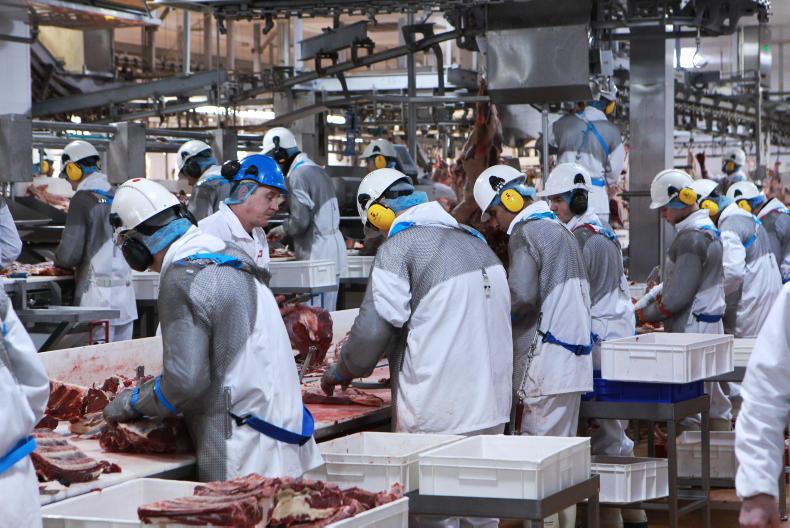The announcement of a points-based immigration system by the UK government has been met with alarm by NI agri-food processors.
In the policy paper released this week, the UK government said it will end access to cheap labour and told employers to concentrate on investing in technology and automation.
Under the proposals, which are to be put into law by way of an Immigration Bill, only 'skilled' workers will be allowed to permanently work in the UK from 1 January 2021.
They will have to achieve a minimum points score of 70. This points system depends on the job on offer, the skill level of the applicant, the ability to speak English and the salary level. To achieve 20 points, the salary must be over £25,600. The minimum salary for any job is £20,480.
There is also 20 points available for jobs on the Home Office Shortage Occupation List. However, while this list now includes vets, it doesn’t include workers in food processing businesses (such as butchers).
The new rules will apply equally to EU and non-EU citizens, although Irish citizens are exempt.
Lobbied
Over the last couple of years, the agri-food industry in NI has lobbied government that it must retain access to non-UK labour, and that given the land border with the Republic of Ireland, it should be treated differently to other parts of the UK.
At present, around half of the workers in NI agri-food processing are from the EU, and in beef and sheep processing this figure could be closer to 70%.
“We bring in people who are unskilled, we train them, they learn English, and they end up on high salaries. In the new system, the majority of people wouldn’t get 40 points, so wouldn’t get in,” explained Conall Donnelly from the NI Meat Exporters’ Association (NIMEA).
In the new system, the majority of people wouldn’t get 40 points, so wouldn’t get in
He also pointed to the NI/Irish protocol, which will mean goods can be traded freely in Ireland from 1 January 2021. However, that freedom of movement will not extend to non-UK and Irish workers, so it potentially leaves NI processors uncompetitive against counterpart businesses south of the border.
That issue was recognised in a report published in January 2020 by the Migration Advisory Committee (MAC), the body which advises government on immigration issues. It pointed to the “unique” situation in NI, and recommended that “special consideration could be given to NI especially if it comes to have a different relationship with the EU compared to the rest of the UK.”
“There is now a big challenge for the NI Executive to ensure that we don’t end up with the worst of both worlds,” said Donnelly.
Seasonal
Meanwhile, the UK government has confirmed that a pilot seasonal workers scheme will allow 10,000 people into the UK this year for a period of up to six months, compared to 2,500 in 2019. This scheme is mainly designed to meet the needs of the horticulture sector. However, the UK industry argues that up to 80,000 seasonal workers are actually required.
Read more
Fruit growers urged to co-operate on labour
Labour shortage reaches crisis point
The announcement of a points-based immigration system by the UK government has been met with alarm by NI agri-food processors.
In the policy paper released this week, the UK government said it will end access to cheap labour and told employers to concentrate on investing in technology and automation.
Under the proposals, which are to be put into law by way of an Immigration Bill, only 'skilled' workers will be allowed to permanently work in the UK from 1 January 2021.
They will have to achieve a minimum points score of 70. This points system depends on the job on offer, the skill level of the applicant, the ability to speak English and the salary level. To achieve 20 points, the salary must be over £25,600. The minimum salary for any job is £20,480.
There is also 20 points available for jobs on the Home Office Shortage Occupation List. However, while this list now includes vets, it doesn’t include workers in food processing businesses (such as butchers).
The new rules will apply equally to EU and non-EU citizens, although Irish citizens are exempt.
Lobbied
Over the last couple of years, the agri-food industry in NI has lobbied government that it must retain access to non-UK labour, and that given the land border with the Republic of Ireland, it should be treated differently to other parts of the UK.
At present, around half of the workers in NI agri-food processing are from the EU, and in beef and sheep processing this figure could be closer to 70%.
“We bring in people who are unskilled, we train them, they learn English, and they end up on high salaries. In the new system, the majority of people wouldn’t get 40 points, so wouldn’t get in,” explained Conall Donnelly from the NI Meat Exporters’ Association (NIMEA).
In the new system, the majority of people wouldn’t get 40 points, so wouldn’t get in
He also pointed to the NI/Irish protocol, which will mean goods can be traded freely in Ireland from 1 January 2021. However, that freedom of movement will not extend to non-UK and Irish workers, so it potentially leaves NI processors uncompetitive against counterpart businesses south of the border.
That issue was recognised in a report published in January 2020 by the Migration Advisory Committee (MAC), the body which advises government on immigration issues. It pointed to the “unique” situation in NI, and recommended that “special consideration could be given to NI especially if it comes to have a different relationship with the EU compared to the rest of the UK.”
“There is now a big challenge for the NI Executive to ensure that we don’t end up with the worst of both worlds,” said Donnelly.
Seasonal
Meanwhile, the UK government has confirmed that a pilot seasonal workers scheme will allow 10,000 people into the UK this year for a period of up to six months, compared to 2,500 in 2019. This scheme is mainly designed to meet the needs of the horticulture sector. However, the UK industry argues that up to 80,000 seasonal workers are actually required.
Read more
Fruit growers urged to co-operate on labour
Labour shortage reaches crisis point






 This is a subscriber-only article
This is a subscriber-only article










SHARING OPTIONS: